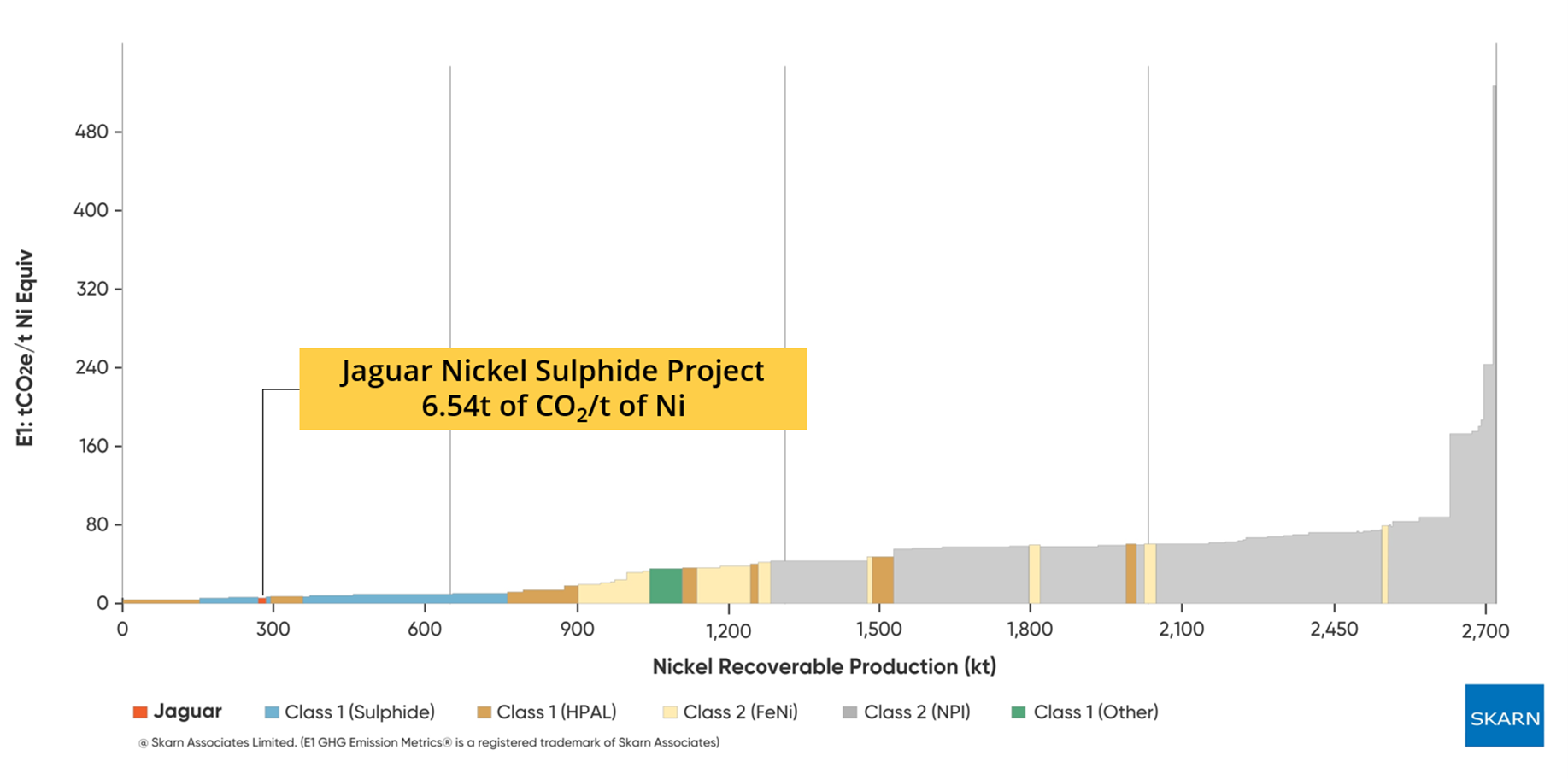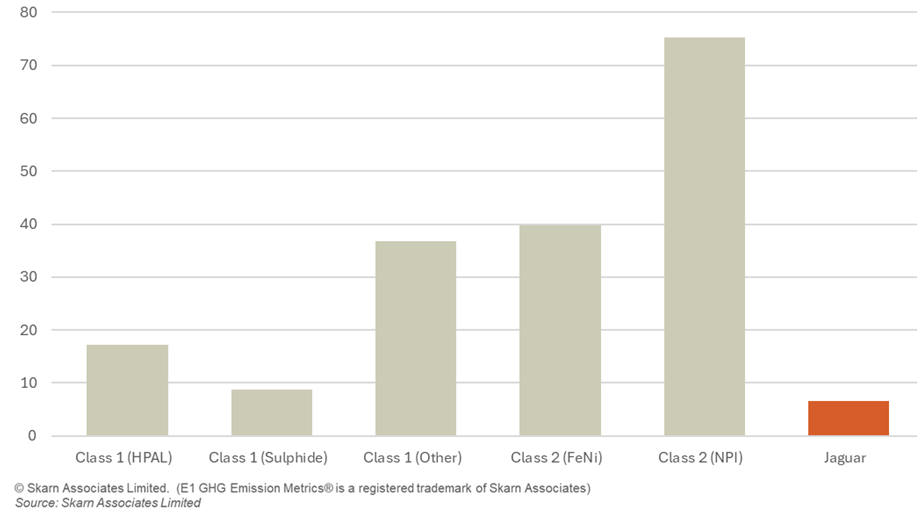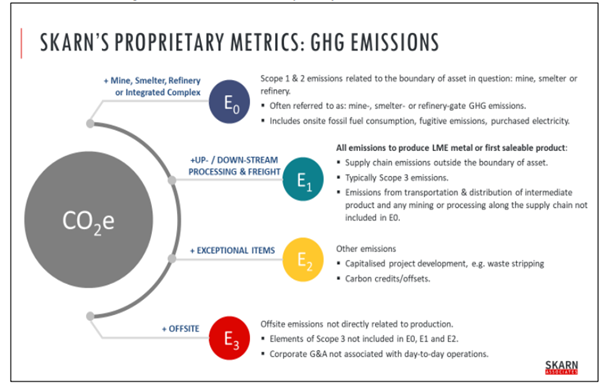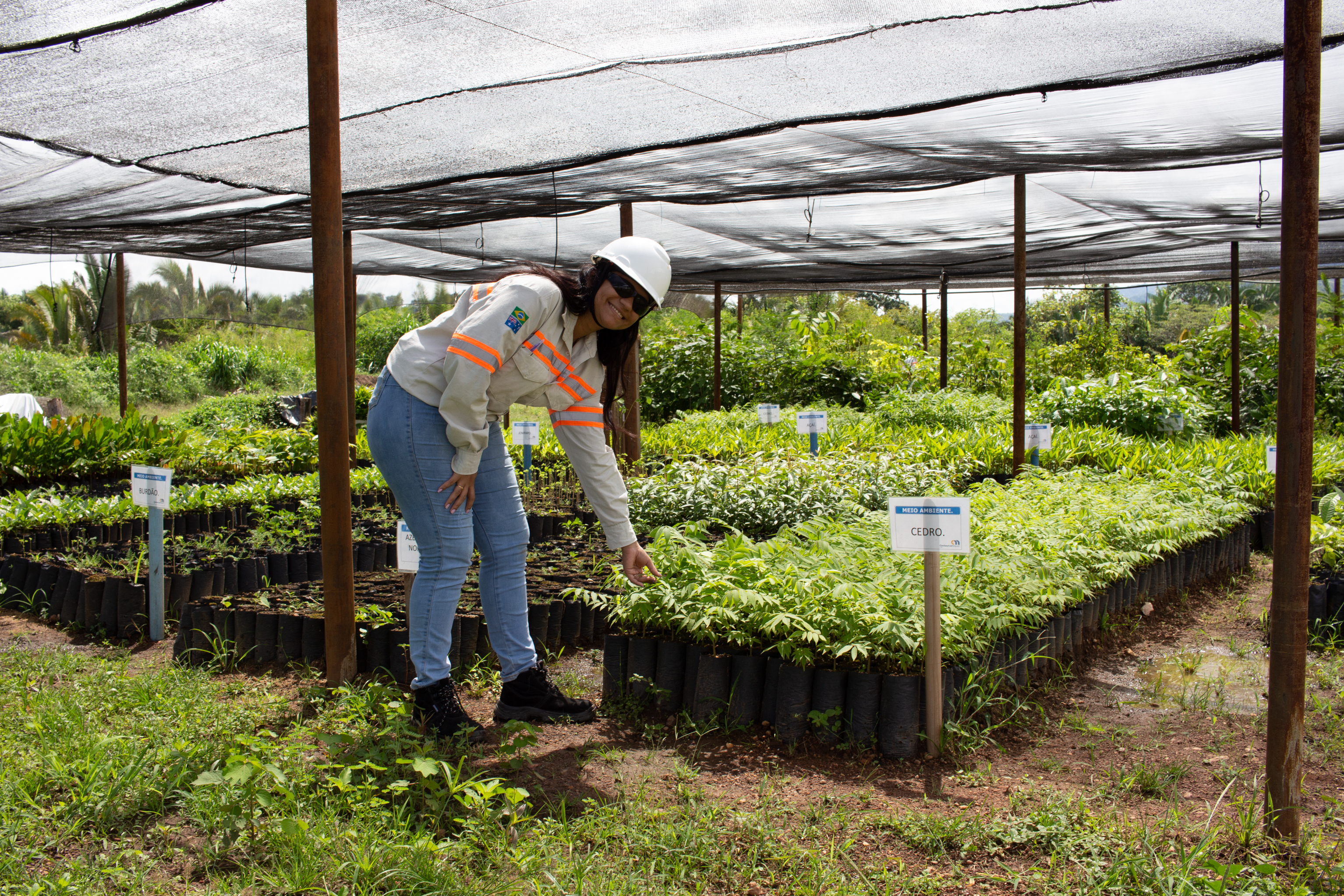Environment, Social and Governance
Centaurus Metals is committed to delivering strong environmental, social and governance (ESG) outcomes across every facet of our operations.
World-leading carbon potential
The Jaguar Project has the potential to become one of the world’s foremost nickel projects in terms of its carbon footprint, putting it in a strong position to attract strategic investment from potential partners seeking new supply of low carbon nickel concentrate.
Centaurus has commissioned independent studies by specialist metals and mining ESG research company, Skarn Associates, to assess the forecast carbon emissions from the Jaguar Project.
Based on the project parameters outlined in the Jaguar Value Engineering Process announced in May 2025, Skarn found that, once in production, Jaguar’s life-of-mine CO2 footprint will be lower than 90% of global nickel production.
This reflects the Project’s unique attributes as a high-grade (+30% Ni), open pittable nickel sulphide project powered by 100% renewably sourced energy distributed via the 230kV national power grid in Brazil.
When in operation, the ‘E1’ greenhouse gas (GHG) emissions for the production of nickel concentrate at Jaguar are expected to be extremely low at 6.54 tonnes of CO2/tonne of nickel equivalent, which is lower than 90% of existing global nickel production.
Jaguar’s on-site ‘E0’ GHG emission levels are even lower, at only 1.62t CO2/t NiEq.
The graph below shows where Jaguar ranks on a global basis on the Skarn Associates GHG Nickel Intensity Curve - Nickel (E1 GHG Emission Metrics®)
Skarn Associates GHG Intensity Curve – Nickel (E1 GHG Emission Metrics®)

The low emission levels are a function of the relatively high-grade nickel coming from open pit mining sources and, importantly, the fact that Centaurus will be able to source its power on the grid from 100% renewable sources.
The assessed emission levels will be 85% lower than the industry average (production weighted) of 46.6 tonnes of CO2/tonne of nickel equivalent.
In addition to the environmental benefits, Jaguar’s use of renewable energy also leads to very low power costs, with the cost of distributed power to Jaguar estimated at just US$0.04/kWh.
The graph below demonstrates where the Jaguar Nickel Sulphide Project sits from an emission perspective relative to other sources of Class-1 nickel as well as Class-2 nickel from various production processes.


Native Forest Revegetation
The area surrounding the Jaguar Project has seen decades of widespread land clearing for stock grazing and farming. This has resulted in fragmentation of the remaining native forests.
Centaurus sees an opportunity to now reconnect these fragmented forest remnants to create wildlife ecological corridors for both fauna movement and flora habitat expansion.
The Company has established a dedicated project rehabilitation plant nursery, with four locally recruited staff members who are germinating seeds from 32 locally collected native tree species and raising seedlings to a size suitable for planting out on disturbed areas.
Since the start of the program in January 2022, more than 30 hectares have been revegetated with more than 13,000 native seedlings planted.

A Company-wide ESG framework
In 2020, Centaurus commenced development of its formal environmental, social and governance (ESG) policy framework, which is currently based on the recommendations and principles of two different sources; being:
- Towards Sustainable Mining (TSM) Principles - a globally recognised sustainability program that supports mining companies in managing key environmental and social risks
- Principles of Responsible Investment (PRI) - a United Nations-supported international network of investors working together to contribute to the development of a more sustainable global financial system
Throughout the exploration and development of Centaurus' projects, the Company remains committed to fostering strong community relationships with nearby towns and regional centres, as well as ensuring we adhere to local environmental regulations. All our projects are overseen by a highly experienced Brazilian management team, enabling Centaurus to work in meaningful alignment with local practice.
Centaurus aims to support regional economies through:
- economic development and building capability at the local level with viable and sustainable procurement and local supply contracting opportunities;
- employing locally where possible; and
- building systems for financial and in-kind support for funding community initiatives and infrastructure programs.
Some of the initiatives implemented by Centaurus in the region surrounding the Jaguar Project include:
- All Centaurus employees working on the Jaguar Project live in the local town with their families, solidifying the relationship between the Company and the local community.
- More than 90% of the current project workforce, including employees and outsourced labour, are from the south-eastern region of the State of Pará.
- More than 80% of the Company’s investment expenditure relating to exploration and development work at the Jaguar Project to date has been awarded to the local community through drilling contracts, engagement of consultants and services and purchase of equipment and supplies.
- Centaurus has constructed bridges, installed culverts and upgraded the road between the town and the Jaguar site, with further upgrades now underway in conjunction with local municipalities. The improved roads make travel for local residents significantly safer and less time consuming, particularly during the annual wet season.
- Collection of extensive flora, fauna, hydrological and social data in the region, which will be used to prepare the environmental and social programs to be implemented during the construction and operation phases of the Jaguar Project. These programs are aimed at minimising the negative impacts and maximising the positive impacts of the project.
- During the collection of social data, more than 95% of local community residents interviewed were in favour of the project.
Centaurus has also carried out a series of development measures in the communities surrounding the Jaguar Project:
-
- Development of the Empower Jaguar Program (Programa Capacita do Jaguar), which aims to up-skill approximately 1,500 residents of São Félix do Xingú, Tucumã and Ourilândia do Norte to increase employment opportunities during future phases of the Jaguar Project.
- Implementation of the Jaguar Partners Program (Programa Parceiros do Jaguar), informing and educating local suppliers on the requirements to become a Jaguar Project supplier.
- Donation of two vehicles, medical equipment and consumables to fight malaria and support the state health services in Tucumã and São Félix do Xingu.
- In conjunction with an educational campaign to reduce, re-use and segregate domestic waste, fourteen recyclable waste bins were donated and installed in Ladeira Vermelha, Minerasul, Tucumã, Ourilândia do Norte and São Félix do Xingu.
- Donation of one 10,000L water tank to the village of Minerasul.
- Donation of 8,000 litres of diesel oil for SFX municipality, for dust suppression and road maintenance.
- 4000L of diesel have been donated to the Pará State Military Police to increase police presence to improve the safety and security of residents and businesses.
- Dust suppression of roads at Minerasul and Ladeira Vermelha villages during dry season.
- During the COVID-19 pandemic, the Company donated more than 400 COVID-19 test kits, 500 facial masks and 5,000 white coats to the municipalities in the region.
Further actions will be implemented during future phases of the Jaguar Project.


